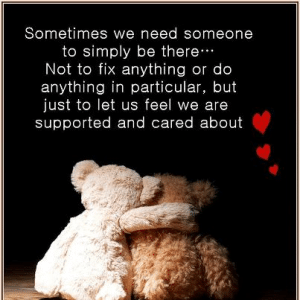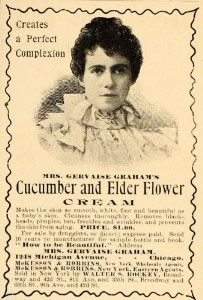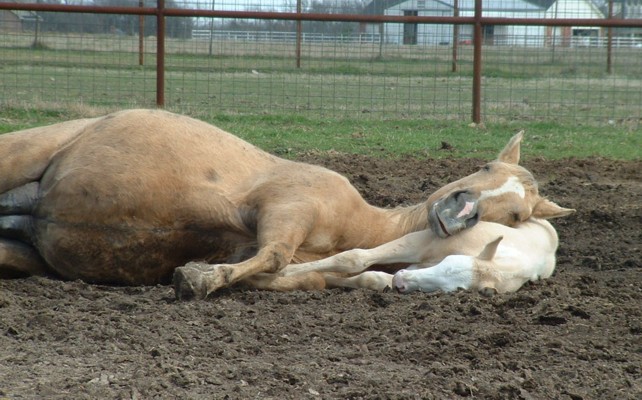A couple of year back, I got a supplement catalog in the mail. Now, if you’ve been reading my articles for any time, you should have a pretty good idea what I think of the supplement industry as a whole, which is, frankly, not much (that quickly sums things up, for the sake of brevity, as well as for the sake of an audience of all ages).* But anyway, I’m reading through this compilation of beautifully illustrated, glowingly testimonialized, happy bunch of horse pucky and I kept getting hit over the head with the same word, again, and again, and again (and again, and again, and again). So I thought I’d write/rant about it.
I’d like you to think about something. Do you ever think about why you buy something for your horse? For example, if you buy a blanket for your horse – whether he needs it or not (CLICK HERE to read what I generally think about blankets) – you’re buying it because you want to try to keep your horse warmer. If you want pink leg wraps, it’s because you 1) Want to wrap your horses legs, and 2) because you like the color pink. The point is that you have a specific purpose when you make most of your horse purchases. And, mostly, I think that’s a good thing.
 So, have you ever heard the term “weasel word?” If not, it’s a term used when a word or phrase is meant to create an impression that something specific and meaningful is happening, when, in fact, there’s nothing specific at all: just vagueness and ambiguity. A phrase like “leading scientists agree” is a good example of a the use of weasel words, because you never get to know who the scientists are, much less what they are agreeing on. Supplement catalogs are FULL of weasel words, because 1) The products mostly can’t be shown to do anything important (with a very few specific exceptions), and 2) The companies have to try to sell their products, in spite of the fact that there’s precious little evidence that any of them do anything. And it must be working, because they are apparently selling like hotcakes.
So, have you ever heard the term “weasel word?” If not, it’s a term used when a word or phrase is meant to create an impression that something specific and meaningful is happening, when, in fact, there’s nothing specific at all: just vagueness and ambiguity. A phrase like “leading scientists agree” is a good example of a the use of weasel words, because you never get to know who the scientists are, much less what they are agreeing on. Supplement catalogs are FULL of weasel words, because 1) The products mostly can’t be shown to do anything important (with a very few specific exceptions), and 2) The companies have to try to sell their products, in spite of the fact that there’s precious little evidence that any of them do anything. And it must be working, because they are apparently selling like hotcakes.

Horses, supporting each other in the snow, with the support of their hair coats, without the support of blankets
Anyway, I went through the whole catalog, and I looked for the weasel word that was repeated most frequently. Know what it was? “Support.” So how many times did I see the word, “support?” Well, in 40 of 54 pages, it was used 33 times. That’s 82.5% of the pages that claim that this product “supports” one thing of another.
ASIDE: Fourteen of the pages in the catalog were used to sell blankets. Apparently, blankets aren’t used to support anything, although they are, according to the catalog, the horse’s “first line of defense” against cold weather. Go figure – here I thought that the horse’s coat had something to do with keeping him from getting cold.
But anyway, back to “support.” Words have to mean something, right? That’s why there are dictionaries. So, after consulting with a few of them, here are a few definitions of the word.
- “A thing that bears the weight of something, or keeps it upright.” In that sense, it’s pretty critical. Without a beam supporting the roof of your house, the roof is going to come down. In that sense, you really need support.
- “Give assistance to; enable to function or act.”
- “To keep from weakening or failing.”
- “To give approval to”
Now I rather think that when “support” is used as a weasel word, it implies any of the first three definitions. In that way, “support” sounds like it is very important indeed. I mean, without the “support,” how in the heck is your horse supposed to function?
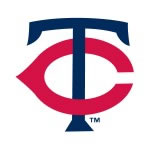 But here’s the thing. In fact, there’s absolutely no reason to believe that the “support” given by most supplements is much different than the support that people give to their favorite sports teams. I mean, I hope that my teams win, I have a couple of clothing items that have their logos on them, I’ve gone to a few games, I catch one on TV sometimes, but I’m not about to try to convince you that any of this “support” is critical to their success or failure.
But here’s the thing. In fact, there’s absolutely no reason to believe that the “support” given by most supplements is much different than the support that people give to their favorite sports teams. I mean, I hope that my teams win, I have a couple of clothing items that have their logos on them, I’ve gone to a few games, I catch one on TV sometimes, but I’m not about to try to convince you that any of this “support” is critical to their success or failure.
From reading the supplement catalog, however, you’ve gotta believe – and I want to emphasize the word “believe” – that just about everything in the horse’s body needs to be supported in some fashion.
“And,” you ask, “Just exactly what do you mean by everything?”
Well, since you asked, here’s a list, from the catalog.
- Joints
- Your horse – (YOU GO, horse)
- Tendons
- Ligaments
- Stomach
- Skin
- Coat
- Feelings of well-being and contentment
- Normal hormone levels
- Normal healing
- Recovery – (apparently, from whatever your horse needs to recover from)
- Digestive health
- Healthy nervous system
- Healthy hoof growth
So, apparently, your horse is in need of a lot of support. Frankly, I’m a bit alarmed by the lack of a product to support your horse’s immune system, not to mention his blood, pancreas, or liver, but don’t worry, there are plenty of other catalogs. Good thing that horses don’t have a gall bladder, or there would probably be something to support that, too.
NOTE: I did find a site that said that horses don’t have a gall bladder, “as such.” Which, to me, is sort of like saying that I don’t have ivory tusks, “as such.”
Want some more? Here’s a list (from http://changingminds.org/ – it’s a great site. Plus one that I added). Anything look familiar?
- Helps, supports, is useful (friendly, but no real value added)
- Optimum (when there’s no definition of such thing)
- Better, improved, gains (does not say how much)
- Acts, works, effective, efficient (action, but no quantitative value)
- Seems, appears, looks, is like (gives impression, not real change)
- Many, most, virtually, almost all (‘lots’ but no real quantity)
- Up to, from, at least, as many as (talk about the best case)
But back to the “support.” I mean, seriously, doesn’t it kind of make you wonder how horses lived for, say, a week and a half, much less over 50 million years? If your horse needs something, he doesn’t need “support,” he needs something that is specific. So, for example, if you live in parts of the United States, the soil might be deficient in selenium. If you’re in one of those parts, it might be advisable to give him extra selenium. That’s a specific need being filled, not some vague notion of “support.” (By the way, if you’re worried, ask your veterinarian. And, you can CLICK HERE to see a county-by-county map of selenium concentration in the US).
Now let’s say that you’re just a tad bit skeptical about all of this “support” that your horse supposedly needs. Never fear, you can apparently be assured that the products “work.”
“And just exactly how?” you might ask.
Easy. In addition to the 33 times that “support” is mentioned, there are a total of 25 testimonial anecdotes from satisfied customers. Testimonials are great (I guess) if you want to sell face cream, but seriously, we’re talking about your horse’s health here. It’s important. Don’t you think that someone who wants you to feed something to your horse should have to prove 1) It’s necessary, 2) It’s not harmful, 3) It’s effective, and 4) The product contains what the label says it contains? If any of those things are important to you, you should think before you run out an buy a bunch of supplements for your horse, and especially if the only evidence that you have to go on is an eager, earnest, smiling face.
Look, the fact is that the supplement industry has pretty much been invented in the last couple of decades. It’s an industry with essentially no oversight, and it produces products that have essentially no evidence of effectiveness. By and large, it’s an industry that’s built on the false premise that horses are just one measured capful away from falling into an abyss of ill health and poor performance, kept from plunging in only by the “support” of this, that, or the other product.
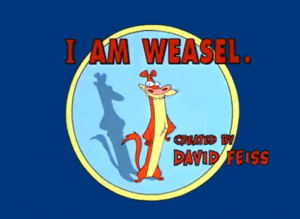 Don’t fall for weasel words like “support” (or “maintain” – that’s another one). Personally, I think that if you run across the word, “support,” being used in advertising or talking about a product, you should just tear up the page and use it to start a nice fire, and sit by it with a glass of wine and one or more people that you love. At least the page will have been put to good use. And don’t fall for testimonials, either, no matter who is giving them.
Don’t fall for weasel words like “support” (or “maintain” – that’s another one). Personally, I think that if you run across the word, “support,” being used in advertising or talking about a product, you should just tear up the page and use it to start a nice fire, and sit by it with a glass of wine and one or more people that you love. At least the page will have been put to good use. And don’t fall for testimonials, either, no matter who is giving them.
The fact of the matter is that there are a lot of people out there with their hands out, creating anxiety in horse owners so as to get them to buy products or services. It’s making horse owning more expensive, and I think that it’s making some people not want to own horses. That’s bad for people, and bad for horses, because people won’t own horses if they think it’s too expensive.
In fact, I think this kind of behavior is typical of a, well, typical of a real weasel.
******************************************************************************************************************************
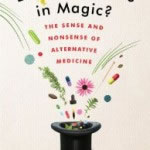 * If you really want to read about the rise of the supplement industry, please go get the book, “Do You Believe in Magic,” by Dr. Paul Offit. You can read about it, and even get it, if you CLICK HERE.
* If you really want to read about the rise of the supplement industry, please go get the book, “Do You Believe in Magic,” by Dr. Paul Offit. You can read about it, and even get it, if you CLICK HERE.


